Gujarat’s Vishad Hadmatiya became the first village in the country where no Dalit is a Hindu anymore
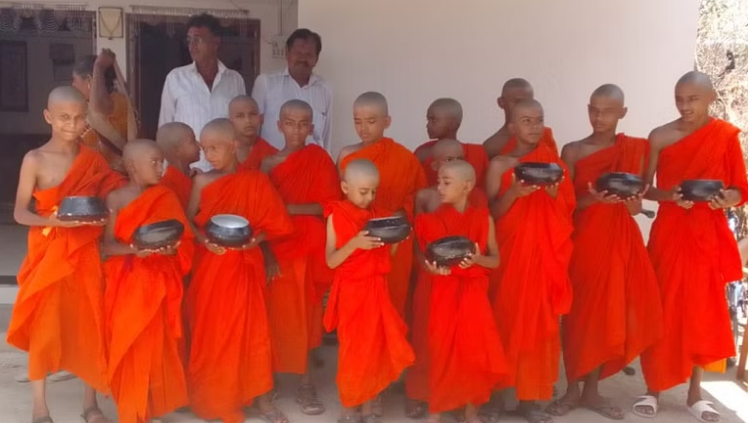
In a village with a population of 2.5 thousand, 500 people from all 75 Dalit families embraced Buddhism.
Gujarat. About 22 km from the Junagadh district headquarters, Vishad (Vishal) Hadmatiya village in Taluka Bhesan had no special identity until a few days ago. But after an unprecedented incident that happened here on May 21, this village has started being discussed far and wide.
All the 75 Dalit families of this village, who have been facing the brunt of caste discrimination for years, abandoned Hinduism together and accepted Buddhism after formal initiation. Vishad Hadmatiya has now been identified as such a village in India where all scheduled caste people will be called Buddhists.
Buddhists have taken a pledge to follow Baba Saheb’s 22 vows, in which equality, equality, compassion and fraternity behavior with everyone, adoption of scientific approach in life, staying away from intoxication and ostentatious living have been given priority.
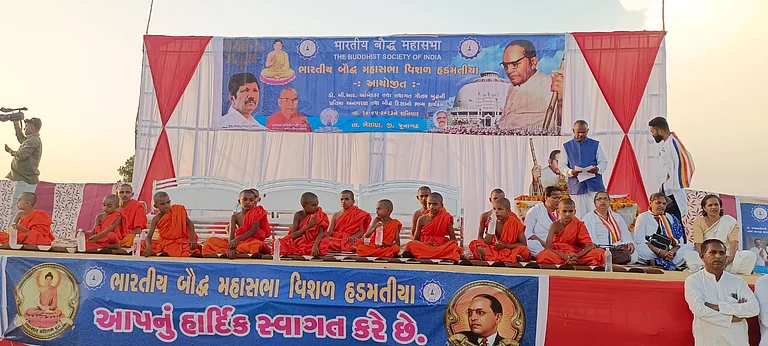
After receiving Dhamma initiation, there is no place left for Hindu customs, festivals, beliefs and rituals in the life of neo-Buddhist people. Instead of bhajan kirtan in their colony, the voices of Buddha Vandana are now heard.
Significantly, the population of this village is around 2500, in which there are 500 members of 75 scheduled caste families. There are also some tribal people whose numbers are relatively less. The literacy rate is around 75 percent and most of the people make a living by doing agriculture and labor. Most of the people leave for the nearby towns and cities by 8 in the morning for wages and return home by 7 in the evening.
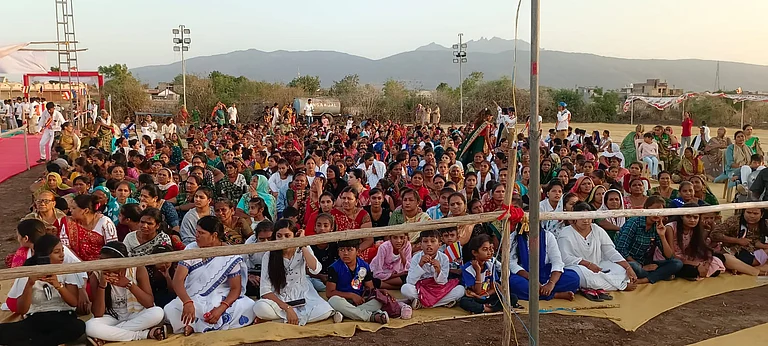
Sanatan Dharma insulted, Baba Saheb showed the way
The credit for spreading Buddhism in the village goes to 50-year-old Mansukh Bhai Vaghela, himself a follower of Buddhism since 2013. Mansukh Bhai, who regrets not being able to complete his 10th standard, is a laborer by profession, but he has by heart all the teachings of Baba Saheb and the Panchsheel knowledge of Gautam Buddha.
The importance given by Baba Saheb to education had such an impact on him that by working hard day and night, Mansukh Bhai got his children to study according to their wishes, due to which today his daughter has done a course on fashion technology from ITI. One son is also on his own feet after getting a college education while the youngest boy is still in school.
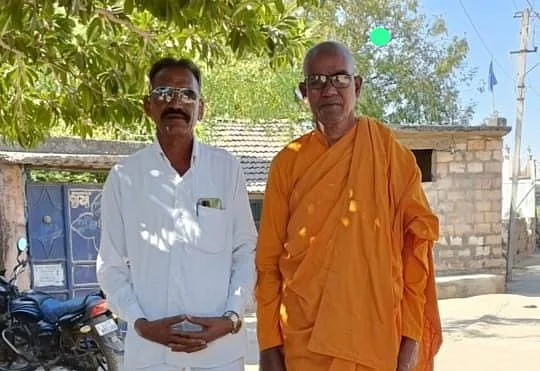
Mansukh Vaghela with Bhante Anand
In conversation with The Mooknayak, Mansukh Bhai narrated the situation of caste discrimination and oppression in Hadmatiya village. “ In my childhood there was a lot of caste discrimination which has reduced a lot now but still our people get disrespect from upper caste people in everyday life. They don’t even include me”, says Mansukh Bhai. Mansukh is currently the president of Bhesan taluka of Indian Buddhist Mahasabha and due to his efforts the work of propagation of Buddhism continued in the village.
“Sanatan Dharma has taught people the lesson of discrimination and untouchability, we lower caste people are still looked down upon by upper caste people in the village . They won’t get their hair cut in his shop,” 75-year-old Narayan Vaghela, a village elder, tells The Mooknayak. Narayan says that earlier the people of the society did not oppose them, but with the increase in the level of awareness and education, the Dalit society has started raising its voice against discrimination.
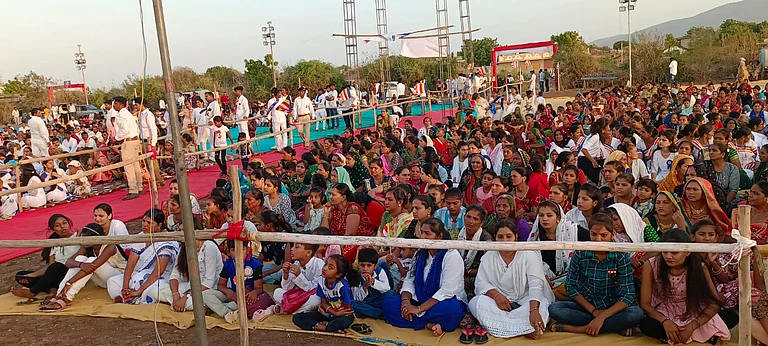
Do not participate in Garba events
Sunaina, a village girl, tells The Mooknayak that during Navratri, when Garba was celebrated all over Gujarat, many Dalit girls like her, with longing eyes, used to dance to folk songs in the collective Raas Garba events of the village . She used to look at me heartily. “We were not included in the Dandiya Raas events as these village events are rarely held for upper caste people,” says Sunaina.
Some other people of the village tell that there was a time when shopkeepers used to purify the note by sprinkling water on taking money from a Dalit person. “Now shopkeepers in market place take money from lower caste people without any hesitation because it is their business. They don’t discriminate in village school because they fear law but still there is lack of inclusiveness which hurts a lot” Villager Govind Brother says.
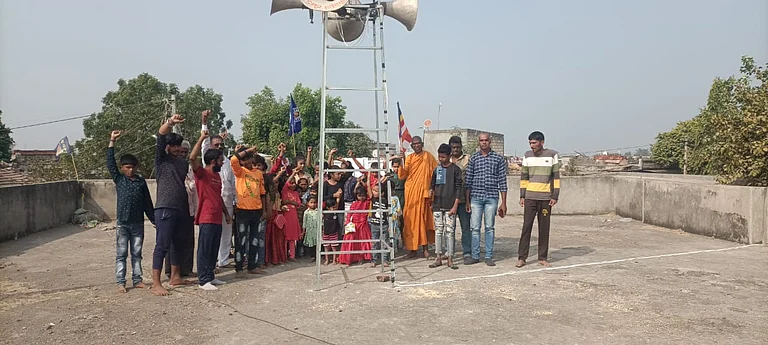
The locality of Dalit families in the village is different, in which most of the houses are pucca, but due to the tight financial condition, the lack of basic facilities is visible here. On an average, 5-6 members of a joint family reside in each house in two-room houses. The residents believe that the weak economic condition does not cause much pain, but the contempt of the people in their own village pierces the heart.
For years, the Dalit families of Vishad Hadmatiya village bore the brunt of being humiliated by the upper class people in their village and outside. In such a situation, due to the increasing spread of Buddhism in Gujarat, due to the influence of many Ambedkarite voluntary organizations including Swayam Sainik Dal, Buddhist Mahasabha, etc., consciousness began to spread among the people and they were freed from years of humiliation and disdain only by following the path shown by Babasaheb and Tathagat. The path to liberation was visible.
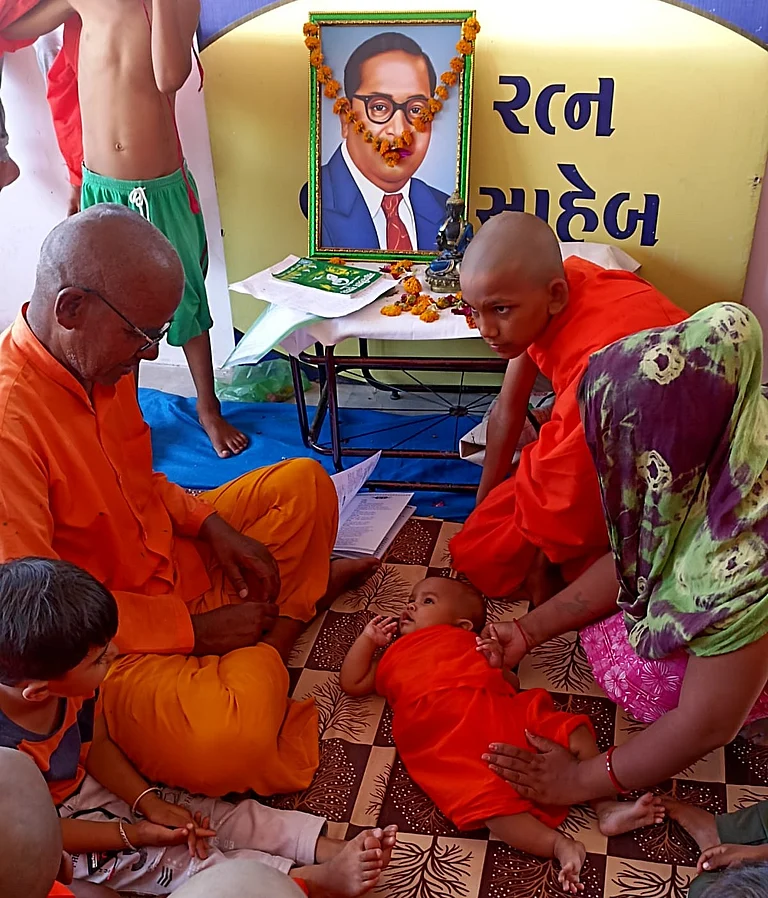
Everyone practiced molding life according to Buddhist principles for about five-six months and imbibed Buddhism on May 21 at the Dhamma Deeksha ceremony organized by the Indian Buddhist Mahasabha. Many officials including Praveen Nikhade, VH Gaikwad along with Bhimrao Yashwant Rao Ambedkar, the national president of Buddhist Mahasabha and grandson of Babasaheb were involved in this event.
problem in government approval
The Dalit people of Hadmatiya village applied to the district collector for conversion under the prescribed procedure, but the experts said that the competent authority has been asked to fulfill the shortcomings in the documents, only after which the conversion will be recorded in the government records. . Mansukh Vaghela said that after converting to Buddhism, many people change their Hindu names as well, but no villagers here have changed their names because people may face many difficulties in changing their names in other identity documents including Aadhaar card. Is.
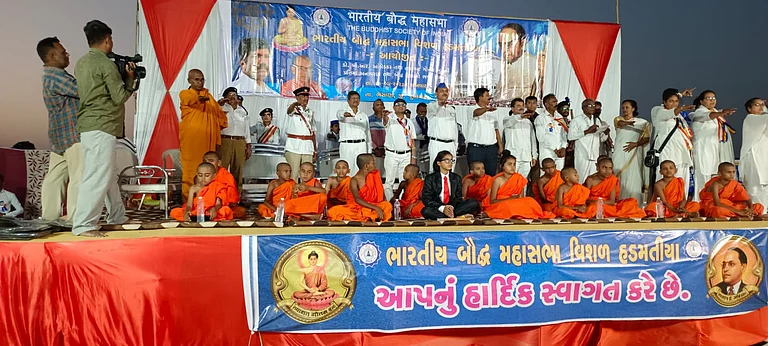
it’s hard to adopt anything new
It is difficult to give up the customs and beliefs that have been ingrained since childhood, especially for women who are considered to be more religious and soft-hearted than men by nature. Jaishree’s wife Jayanthi Bhai of the village says that the decisions like removing pictures of deities from the house, leaving worship lessons, fasting etc., not immersing bones on death etc. will be difficult, but the humiliation and pain in the form of discrimination while living in Hindu religion. They have suffered, no difficulty is too big in front of them.
Another woman, Anju Vaghela, says that after adopting Buddhism, the community will be free from drug addiction, domestic strife will end and women will also get equal status, which will empower housewives as well.
Most Buddhists in Gujarat after Maharashtra
Bhanteji Anand (Buddhist monk) of Amravati (Maharashtra), who has given Dhamma initiation to the villagers in Vishad Hadmatiya, has been spreading Buddhism in many villages and towns of Gujarat for the last 10 months. Bhante Anand was a loco pilot in the railways in Maharashtra who left 20 years of government service and devoted his life to Buddhism. He has completed 10 years since leaving the job. By connecting the deprived community with Buddhism, they consider their welfare as the goal of their life.
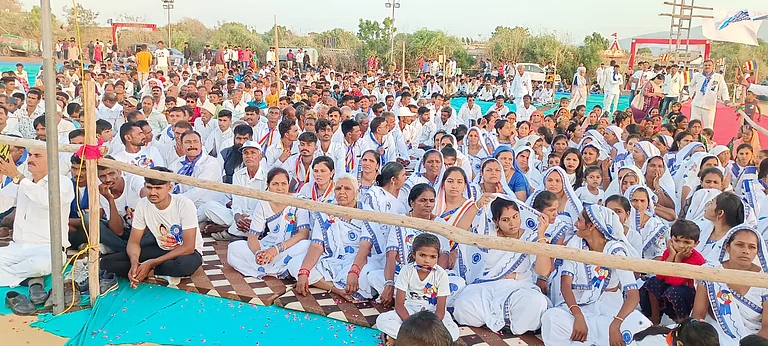
the silent heroIn a special conversation with, he told that after the adoption of Buddhism by Babasaheb in Maharashtra in 1956, lakhs of people abandoned Hindu religion. 95% of Dalits in Maharashtra have converted to Buddhism and have become empowered. Bhante Anand says that there have been charismatic changes in the lives of those who adopted Buddhism, their standard of living, standard of living and education has improved, cases of Dalit atrocities have reduced, they have become free from discrimination. He says that the number of Buddhists in Gujarat has increased rapidly in the last few years because the Dalit community in the province is aware. Bhante Anand said that “all they need is guidance and 100% Dalit families taking Dhamma initiation in Vishad Hadmatiya is the first and historical event not only in Gujarat but in whole of India. Many people have been inspired, For the last two days, invitations are being received continuously from many towns and villages. Preparations are being made to organize more such events in Rajkot and other districts in the coming days.”
Baba Saheb’s 22 vows
On October 14, 1956, after converting to Buddhism himself, Baba Saheb administered these 22 vows to hundreds of people after reciting Trisharan and Panchsheel, in which the names of Brahma, Vishnu, Mahesh and other Hindu gods and goddesses were said to So will not have faith in him, nor will we worship him. Swearing not to consider Buddha as an incarnation of Vishnu was also a part of this vow. Not stealing, staying away from drug addiction, believing in equality, walking on the eightfold path of Buddha, etc. are also included.



